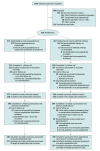Five-Year Follow-up of Antibiotic Therapy for Uncomplicated Acute Appendicitis in the APPAC Randomized Clinical Trial
- PMID: 30264120
- PMCID: PMC6233612
- DOI: 10.1001/jama.2018.13201
Five-Year Follow-up of Antibiotic Therapy for Uncomplicated Acute Appendicitis in the APPAC Randomized Clinical Trial
Erratum in
-
Incomplete Information in Flow Diagram.JAMA. 2018 Oct 23;320(16):1711. doi: 10.1001/jama.2018.15864. JAMA. 2018. PMID: 30267084 Free PMC article. No abstract available.
Abstract
Importance: Short-term results support antibiotics as an alternative to surgery for treating uncomplicated acute appendicitis, but long-term outcomes are not known.
Objective: To determine the late recurrence rate of appendicitis after antibiotic therapy for the treatment of uncomplicated acute appendicitis.
Design, setting, and participants: Five-year observational follow-up of patients in the Appendicitis Acuta (APPAC) multicenter randomized clinical trial comparing appendectomy with antibiotic therapy, in which 530 patients aged 18 to 60 years with computed tomography-confirmed uncomplicated acute appendicitis were randomized to undergo an appendectomy (n = 273) or receive antibiotic therapy (n = 257). The initial trial was conducted from November 2009 to June 2012 in Finland; last follow-up was September 6, 2017. This current analysis focused on assessing the 5-year outcomes for the group of patients treated with antibiotics alone.
Interventions: Open appendectomy vs antibiotic therapy with intravenous ertapenem for 3 days followed by 7 days of oral levofloxacin and metronidazole.
Main outcomes and measures: In this analysis, prespecified secondary end points reported at 5-year follow-up included late (after 1 year) appendicitis recurrence after antibiotic treatment, complications, length of hospital stay, and sick leave.
Results: Of the 530 patients (201 women; 329 men) enrolled in the trial, 273 patients (median age, 35 years [IQR, 27-46]) were randomized to undergo appendectomy, and 257 (median age, 33 years, [IQR, 26-47]) were randomized to receive antibiotic therapy. In addition to 70 patients who initially received antibiotics but underwent appendectomy within the first year (27.3% [95% CI, 22.0%-33.2%]; 70/256), 30 additional antibiotic-treated patients (16.1% [95% CI, 11.2%-22.2%]; 30/186) underwent appendectomy between 1 and 5 years. The cumulative incidence of appendicitis recurrence was 34.0% (95% CI, 28.2%-40.1%; 87/256) at 2 years, 35.2% (95% CI, 29.3%-41.4%; 90/256) at 3 years, 37.1% (95% CI, 31.2%-43.3%; 95/256) at 4 years, and 39.1% (95% CI, 33.1%-45.3%; 100/256) at 5 years. Of the 85 patients in the antibiotic group who subsequently underwent appendectomy for recurrent appendicitis, 76 had uncomplicated appendicitis, 2 had complicated appendicitis, and 7 did not have appendicitis. At 5 years, the overall complication rate (surgical site infections, incisional hernias, abdominal pain, and obstructive symptoms) was 24.4% (95% CI, 19.2%-30.3%) (n = 60/246) in the appendectomy group and 6.5% (95% CI, 3.8%-10.4%) (n = 16/246) in antibiotic group (P < .001), which calculates to 17.9 percentage points (95% CI, 11.7-24.1) higher after surgery. There was no difference between groups for length of hospital stay, but there was a significant difference in sick leave (11 days more for the appendectomy group).
Conclusions and relevance: Among patients who were initially treated with antibiotics for uncomplicated acute appendicitis, the likelihood of late recurrence within 5 years was 39.1%. This long-term follow-up supports the feasibility of antibiotic treatment alone as an alternative to surgery for uncomplicated acute appendicitis.
Trial registration: ClinicalTrials.gov Identifier: NCT01022567.
Conflict of interest statement
Figures



Comment in
-
Antibiotic Treatment for Uncomplicated Appendicitis Really Works: Results From 5 Years of Observation in the APPAC Trial.JAMA. 2018 Sep 25;320(12):1245-1246. doi: 10.1001/jama.2018.13368. JAMA. 2018. PMID: 30264100 No abstract available.
-
In uncomplicated acute appendicitis, 61% of patients initially treated with antibiotics had not had appendectomy at 5 years.Ann Intern Med. 2019 Jan 15;170(2):JC10. doi: 10.7326/ACPJC-2019-170-2-010. Ann Intern Med. 2019. PMID: 30641561 No abstract available.
-
Op.-Verzicht bei unkomplizierter Appendizitis.MMW Fortschr Med. 2019 Feb;161(2):33. doi: 10.1007/s15006-019-0124-5. MMW Fortschr Med. 2019. PMID: 30721498 Review. German. No abstract available.
-
Long-term Follow-up of Antibiotics vs Surgery for Appendicitis.JAMA. 2019 Feb 19;321(7):706-707. doi: 10.1001/jama.2018.19588. JAMA. 2019. PMID: 30778591 No abstract available.
-
Long-term Follow-up of Antibiotics vs Surgery for Appendicitis.JAMA. 2019 Feb 19;321(7):706. doi: 10.1001/jama.2018.19591. JAMA. 2019. PMID: 30778592 No abstract available.
References
-
- Livingston E, Vons C. Treating appendicitis without surgery. JAMA. 2015;313(23):2327-2328. - PubMed
-
- Salminen P, Paajanen H, Rautio T, et al. . Antibiotic therapy vs appendectomy for treatment of uncomplicated acute appendicitis. JAMA. 2015;313(23):2340-2348. - PubMed
-
- Vons C, Barry C, Maitre S, et al. . Amoxicillin plus clavulanic acid versus appendicectomy for treatment of acute uncomplicated appendicitis. Lancet. 2011;377(9777):1573-1579. - PubMed
Publication types
MeSH terms
Substances
Associated data
LinkOut - more resources
Full Text Sources
Other Literature Sources
Medical

